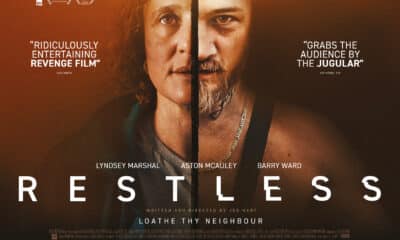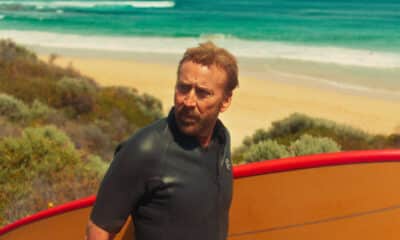Neil Maskell has been a consistent part of the British movie scene for a number of years. His most well known film to date has to be Ben Wheatley’s Kill List, but Maskell has also appeared in Basic Instinct 2 and High-Rise, and is currently playing Churchill in the mega-hit television show Peaky Blinders. The actor also leads one of this week’s big digital releases – Bull.
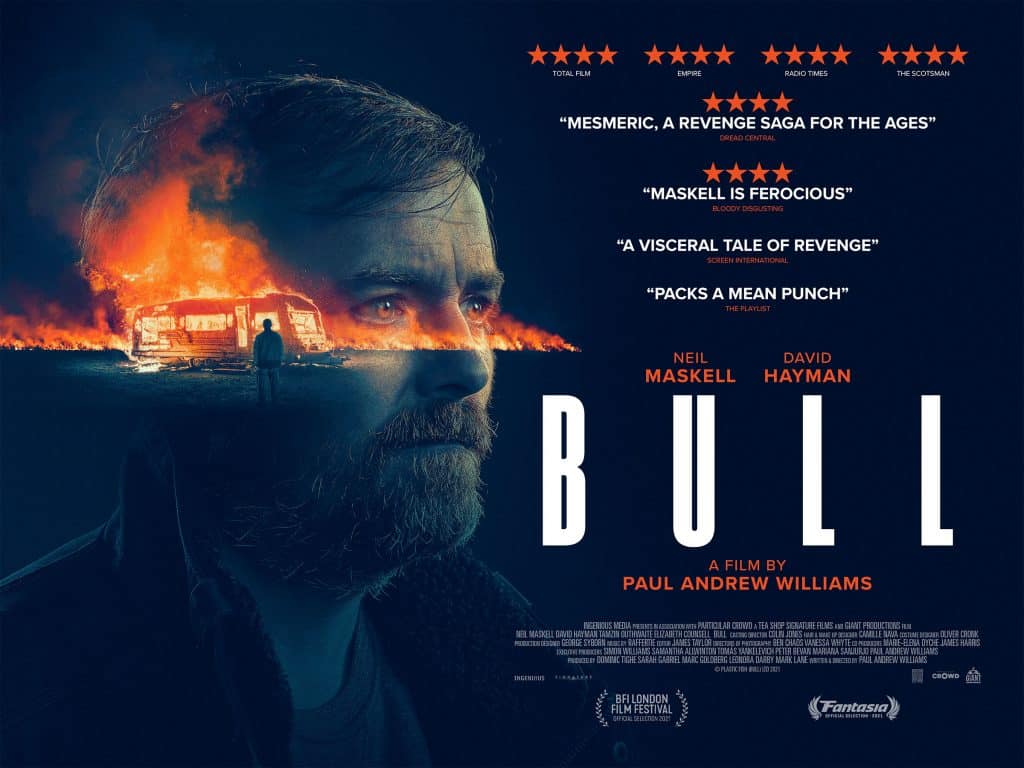
Bull is a revenge thriller like no other. Ferocious, audacious, and blood-soaked, the latest from BAFTA-winning writer/director Paul Andrew Williams (London to Brighton) stars Neil Maskell as a vicious mob enforcer seeking revenge on the gang that double-crossed him. Ten years after he was last seen, Bull (Maskell) returns home to systematically track down those who betrayed him and find his beloved son. With the ominous warning: “I’m coming for all of them,” Bull stalks the members of his former gang, leading up to a savage showdown between his wife and her mob boss father (David Hayman – Taboo, Vertical Limit).
Ahead of the digital release of Bull, we spoke with Maskell to find out what drew him to the project, what it’s like dispatching an onslaught of foes, and why Kill List holds a special place in his heart.
What drew you to the role of Bull?
Even before it got to the character, me and Paul [Andrew Williams] have been talking about working together for years and years. So it was that more than anything. It’s a great part. It’s one of those parts that probably as a young man you always think, “I wonder if I’ll ever get to play a guy on a trail of vengeance,” and it was nice to get to be the guy on a trail of vengeance. I suppose there’s a little bit of wish fulfilment to an extent there, but the main reason really was the chance to work with Paul. I’ve loved him since London to Brighton. We bump into each other every now and again and he says, “we’ll definitely do something” . You hear that a lot when you’re an actor and so you just brush it off as “we’re never going to do that”. It was just nice when it came up and we got the chance.

In spite of all his thuggish behaviour, Bull is driven by his love for his son. We’re used to seeing films about maternal love, but not necessarily paternal. Why do you think it’s important to tell the story from this perspective?
I recognise the emotions and I have a son so that helps as well. What’s interesting about it is it’s not just different because of the paternal relationship, but just where these characters are from. The way they express themselves, which might not be particularly articulate or educated. The place that they’re from is pretty lawless and a trapped sort of place. I think what he’s managed to do by using that relationship as the lynchpin of it, he’s making that relatable to anyone I would hope. I think that’s the power of it, hopefully it makes otherwise people who might be difficult to relate to for a large part of the audience, relatable.
The everyday setting really does help sell the film.
It’s not far from where I grew up actually where we shot that. That definitely had an impact. Often subliminally.
One of the scenes that really stands out is the one set within the confines of a waltzer car. How many takes was that and how dizzy did you get?
Well we didn’t have a lot of time at the fair. We only had two days to shoot everything that was at the fairground, which is about twenty-five percent of the movie, so we were rushing around a lot. For whatever reason, we had a little bit of time on the waltzer, whether it was because we were waiting for another location at the fair to open up, or whatever; he did let us have a few goes at that, much to Kevin Harvey’s dismay, he didn’t really have the stomach for the waltzer. He still managed to give a really good performance in spite of that. It was intense and Paul just kept…by that stage it was right at the end of filming and we shot very fast, only three takes, so it was really cathartic to be able to unload there. I think we maybe had eight or nine goes at that. By the end I was even looking at the lens. He chose not to use that stuff, but I was like, “can I try looking straight down the barrel, breaking the fourth wall”. At the time we thought it was genius, but obviously in the edit he was like, “nah” (laughs).
It really is a fantastic scene, one that does place the audience onboard the car, so I guess there might be a few people feeling a little queasy afterwards.
Yeah I would think. But it looks great.
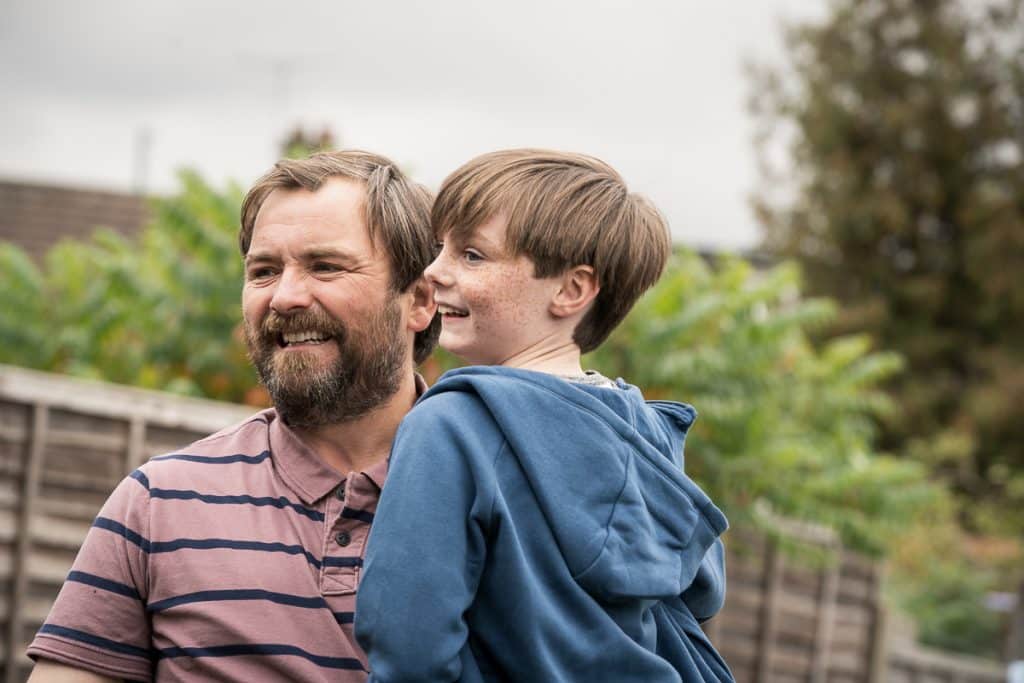
The film follows the revenge thriller structure with Bull working his way through those that wronged him from the bottom up to the top; who was your favourite foe to go toe-to-toe with?
I’m not doing this to avoid the question, because one of the best parts of the experience of doing Bull was the opportunity to work one-on-one with all of those actors. If I had to choose one so that I could answer the question properly… I loved working with Jay Simpson. That scene where we’re in the flat, he’s a heroin dealer, and he’s doing all that stuff about having played five-a-side football. It was so out there and unusual and almost out of place; it just fits in with the film. I like that. But really, whether it’s Dave Nellist in the car where he’s getting upset, the stuff with Kevin [Harvey] on the waltzer, with David Hayman when we’re in that working man’s club with the smashed glass. All the stuff with Lois [Brabin-Platt], who plays my ex-partner, I was just really lucky that I got to do one-on-one with them. People often think that it’s the violence and things that are the fun ones to do, but a lot of the time when you’re doing anything action-based or violence-based, there’s always a lot of logistics and hanging around setting it up. You’ve got to hold this in that way, and do this in that way. As an actor the most interesting stuff is always doing dialogue with another actor, two people looking across a desk or whatever. So it was really a gift in that respect for me.
I guess that’s the thing that differentiates Bull from some of the other revenge thrillers like John Wick or The Crow, is the fact that you do get to have these scenes with everybody on the ladder. They get the opportunity to try and atone for their sins in a way.
Exactly. I liked that aspect of it, working the way up, it’s almost like a video game in that sense, going up the ladder till you get to the kingpin. I dunno quite how my martial arts skills would work out in a John Wick type film. I think I might fall down on that slightly.
Kill List celebrated its tenth anniversary last year. It’s a movie that people are still discovering and falling in love with. How do you feel about the film?
I’m very proud of the film and it changed my life and my career. We’re still very close, me and Ben [Wheatley], and [Michael] Smiley and Myanna [Buring]. We all remained friends which is not necessarily that usual. It’s quite an itinerant job and you move on from people, but we’ve remained close friends which suggests there was something about that experience alongside the film’s success that cemented relationships. A lot of the people that worked on Kill List have just worked on my film; Rob Entwistle doing sound, Martin Pavey sound designer, Nick Gillespie who worked second-camera. It’s a strange one, Kill List. I’m enormously proud of it, I’m so glad that…it sort of didn’t matter whether it was successful or not when we were making it because we had such an incredible experience making it, and the fact that it has gone on to be successful is just great. I’m glad people are still discovering it because it’s a really good film.

You did a lot of directing back in your theatre days; now that you’ve made your feature directorial debut, Klokkenluider with Jenna Coleman and Tom Burke, what can you share about that project?
Hopefully it’ll be out later this year. We’re just waiting for festivals to get back to us at the moment, which is quite a tense thing. It’s a character-based chamber piece disguised as a political thriller. It’s about a whistleblower waiting for a journalist in a remote location and two close protection security guards looking after him and his wife and the sort of relationships that form and some unusual events. It’s quite a sort of off-beat black comedy…because I’ve been editing it for so long it’s stopped being funny. I’m like, “I have no idea if this is funny anymore”, but people who watch it seem to have fun. It’s not primarily a comedy, but there’s humour in it. I think we’ve made something really unusual, not sure if that’s a good or bad thing (laughs).
Bull has journeyed from festival screenings, a cinema release, and now it arrives on digital formats. What do you hope viewers at home will get from their viewing experience?
I think it’s a really compelling watch. I don’t think anyone that’s seen it would say they were clock-watching or bored in any way. It reminds me of old Walter Hill movies. It’s a Saturday night almost B-movie style film, and I think it’s one you can stick on and enjoy. It’s not heavy, difficult, or slow. I think it’s an entertaining, fast, compelling hour and a half. I just hope people really enjoy it.
Signature Entertainment presents Bull on Digital Platforms 8th April.
Kat Hughes is a UK born film critic and interviewer who has a passion for horror films. An editor for THN, Kat is also a Rotten Tomatoes Approved Critic. She has bylines with Dread Central, Arrow Video, Film Stories, and Certified Forgotten and has had essays published in home entertainment releases by Vinegar Syndrome, Arrow and Second Sight. When not writing about horror, Kat hosts micro podcast Movies with Mummy along with her six-year-old daughter.

Latest Posts
-
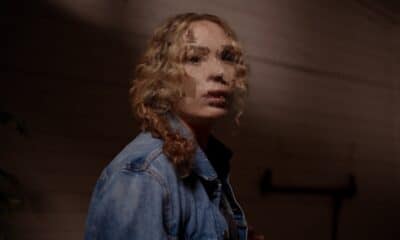

Film Festivals
/ 6 hours ago‘Man Finds Tape’ review: Dirs. Peter Hall & Paul Gandersman [TriBeCa 2025]
Set before, during, and after ‘the Larkin incident’, Peter Hall and Paul Ganderman’s Man...
By Kat Hughes -


Film Festivals
/ 2 days ago‘Dog of God’ review: Dirs. Lauris Abele & Raitis Abele [TriBeCa 2025]
Rotoscope animation, Dog of God, has brought the sex to this year’s TriBeCa film...
By Kat Hughes -


Film News
/ 3 days agoAri Aster’s ‘Eddington’ to open Fantasia 2025, plus more titles added in second wave announcement
This July, Montreal will play host the 29th edition of Canadian genre film festival...
By Kat Hughes -


Film News
/ 3 days agoTom Cruise gets Guinness World Record for latest ‘Mission’
While filming the latest and possibly last instalment in the hit Mission: Impossible franchise,...
By Paul Heath


